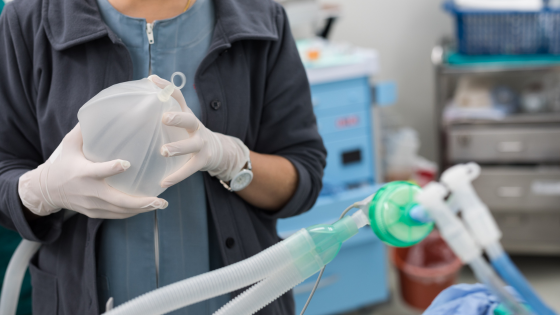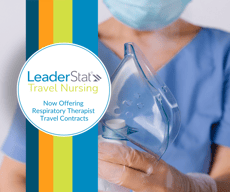
Respiratory therapists fall under the category of allied healthcare. They are responsible for a variety of patient care, from providing oxygen and breathing treatments to managing ventilators and administering medication.
Respiratory therapists (RT) work alongside physicians and nurses to assess overall lung functionality and create customized treatment plans.
Respiratory therapists are a critical part of any medical team, as they are trained to assist doctors in diagnosing, evaluating, and providing care to patients who experience cardiopulmonary issues.
Respiratory patients -- from infants to older adults -- may require specialized breathing treatments on a daily basis, especially if they have a complex illness that primarily affects their lungs and airway.
 At minimum, an associate degree in respiratory care is required, which is typically a two-year program.
At minimum, an associate degree in respiratory care is required, which is typically a two-year program.
Respiratory care students should ensure that the program they’re enrolling in is accredited by the Commission Accreditation on Respiratory Care (CoARC).
Many respiratory therapist professionals earn their bachelor’s and master’s degrees to further advance their careers, and because a higher degree is preferred by many employers.
Respiratory therapists and Registered Respiratory Therapists (RRT) are highly skilled medical professionals who specialize in treating individuals who have issues with breathing. Respiratory care professionals can be found in hospital settings as well as specialty clinics and long-term care.
Their primary responsibility is to assess and treat patients who suffer from acute or chronic pulmonary disorders such as asthma, bronchitis, emphysema, pneumonia, lung disease, chronic obstructive pulmonary disease (COPD), and sleep apnea.
To obtain a career as a Registered Respiratory Therapist (RRT), individuals must first pass the Certified Respiratory Therapist (CRT) exam. This is a 160-question, multiple-choice test conducted via the National Board for Respiratory Care (NBRC). Students are given three hours to complete the CRT exam.
Once the initial CRT exam is passed, respiratory professionals are eligible to take the Clinical Simulation Exam (CSE), which is a requirement to earn the RRT credential.
RRT Specializations
After obtaining certification and/or state licensure as an RRT, respiratory therapist professionals can earn additional credentials to help them stand out in a highly competitive market. The National Board for Respiratory Care offers the following specialty credentials:
 Registered respiratory therapists assess and treat patients who are suffering from respiratory issues ranging from asthma to lung cancer.
Registered respiratory therapists assess and treat patients who are suffering from respiratory issues ranging from asthma to lung cancer. RRT Salaries can vary based on location and level of experience. According to the U.S. Bureau of Labor Statistics (BLS), in 2022, the median pay for respiratory therapists was just over $70,000 annually.
See a complete breakdown of respiratory therapist (RRT) salaries by state.
If respiratory therapy professionals are looking to expand their career and earnings, they might consider finding a respiratory therapy travel contract. Travel respiratory therapists (RRTs) can expect to earn more than $2,200 per week working three 12-hour shifts.
The average travel RRT contract lasts 13 weeks, or 90 days, and that brings the total gross earnings to $28,600. By opting to become a Travel RRT, these specialized respiratory care professionals can easily earn over $100,000 per year.

.png?width=4200&height=1275&name=Bonus%20Tips%20CTA%20(8).png)
Thinking about a career in travel allied healthcare? Registered Respiratory Therapist (RRT) candidates can view open contracts on our Job Board.
If you don't see a perfect fit, send in your resume via our Quick Apply form so that our allied health recruiting team can reach out to you via call or text to discuss your availability and desired location(s).

Fill out the form to be notified of our latest job openings - delivered to your email inbox.
Phone: 614.839.7828
Phone: 480.991.0218
Toll Free: 877.699.7828
© 2022 LeaderStat. All Rights Reserved.